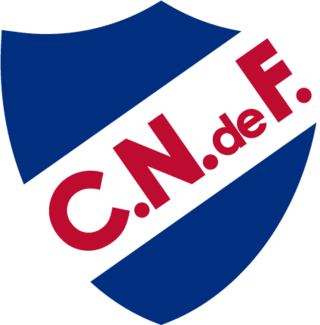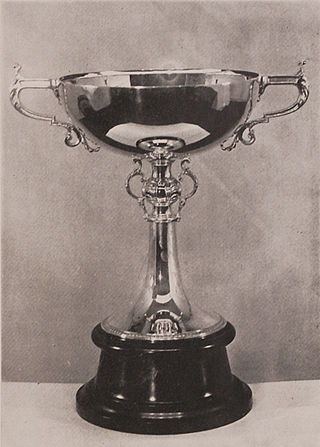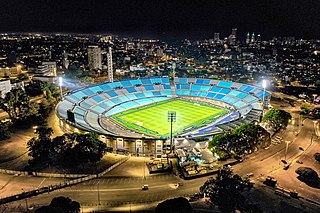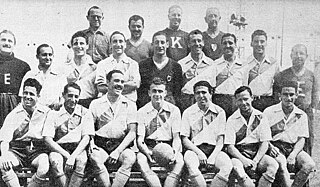
Club Nacional de Football is a Uruguayan professional sports club based in La Blanqueada, Montevideo.

Juan Carlos "Toto" Lorenzo was an Argentine football player and coach. He became an icon for Boca Juniors fans after he coached the club to its first two Copa Libertadores titles.
The 1960 Copa de Campeones de América was the first season of the Copa CONMEBOL Libertadores, CONMEBOL's premier club tournament. Seven associations' clubs entered the first competition, with three not sending a representative. The first match of the tournament was played between Uruguayan side Peñarol and Bolivian side Jorge Wilstermann on April 19 in Montevideo, Uruguay.
Schúbert Gambetta Saint Léon was a Uruguayan footballer. He played as a half-back and was right-footed. Gambetta was a figure in the Maracanazo when he helped keep Zizinho and Ademir out of the game, which helped him to the 1950 FIFA World Cup All-Star Team.

The Copa Ricardo Aldao, popularly called Campeonato Rioplatense and Copa Río de La Plata, was an official AFA-AUF football club competition contested annually, albeit irregularly, between the league champions of Argentina and Uruguay. The trophy was donated by Argentine football executive Ricardo Aldao (1863–1956), who would later become president of the Argentine Football Association.
The 2009–10 Liga Profesional de Primera División season, also known as the 2009–10 Copa Uruguaya or the 2009–10 Campeonato Uruguayo, was the 106th season of Uruguay's top-flight football league, and the 79th in which it was professional. The season was named in honor of Héctor del Campo, ex-president of Danubio.

The 1977 Copa Libertadores finals was the final two-legged tie to determine the 1977 Copa Libertadores champion. It was contested by Argentine club Boca Juniors and Brazilian club Cruzeiro. The first leg of the tie was played on 6 September at Boca Juniors' home field, La Bombonera, while the second leg was played on 11 September at Cruzeiro's venue, Estadio Mineirão. It was Boca Juniors and Cruzeiro 2nd Copa Libertadores finals.

The Copa de Confraternidad Rioplatense Escobar-Gerona was an official football competition organized by both bodies, the Argentine and Uruguayan football association, being first held in 1941.

The 1988 Copa Libertadores de América finals was the final two-legged tie to determine the 1988 Copa Libertadores champion. It was contested by Uruguayan club Nacional and Argentine club Newell's Old Boys. The first leg of the tie was played on 19 October at Estadio Gigante de Arroyito of Rosario, with the second leg played on 26 October at Estadio Centenario of Montevideo.

The 2021 Copa CONMEBOL Libertadores was the 62nd edition of the CONMEBOL Libertadores, South America's premier club football tournament organized by CONMEBOL.

The 1945 Copa Escobar-Gerona, also named Copa de Confraternidad Rioplatense, was the third edition of the competition organised jointly by the Argentine and Uruguayan associations. The 1945 edition marked the first time that the title was actually awarded.

The 1946 Copa Escobar-Gerona, also named Copa de Confraternidad Rioplatense, was the 4th edition of this cup competition organised jointly by the Argentine and Uruguayan football associations. The 1946 edition of the cup was the only edition out of the four editions in which the title was awarded to one club, rather than the two of the previous year or the none of 1941 and 1942.

The 1936 Copa Aldao was the final match to decide the winner of the Copa Aldao, the ninth edition of the international competition organised by the Argentine and Uruguayan Associations together. The final was contested by Uruguayan club Peñarol and Argentine club River Plate.

The 1941 Copa Aldao was the final match to decide the winner of the Copa Aldao, the 14th edition of the international competition organised by the Argentine and Uruguayan Associations together. The final was contested by Uruguayan club Nacional and Argentine side River Plate.

The 1942 Copa Aldao was the final match to decide the winner of the Copa Aldao, the 15th edition of the international competition organised by the Argentine and Uruguayan Associations together. The final was contested by Uruguayan club Nacional and Argentine side River Plate.

The 1945 Copa Aldao was the final match to decide the winner of the Copa Aldao, the 16th edition of the international competition organised by the Argentine and Uruguayan Associations together. The final was contested by Uruguayan club Peñarol and Argentine side River Plate.

The 1947 Copa Aldao was the final match to decide the winner of the Copa Aldao, the 17th edition of the international competition organised by the Argentine and Uruguayan Associations together. The final was contested by Uruguayan club Nacional and Argentine side River Plate.
The 1993 Copa CONMEBOL Finals were the two-legged series that decided the winner of 1993 Copa CONMEBOL, the 2nd. edition of this international competition. The finals were contested by Brazilian club Botafogo and Uruguayan club Peñarol.

The Copa Campeonato del Río de la Plata was an official association football club competition. Unlike Copa Aldao, this cup was contested by champions of dissident associations, in this case Asociación Amateurs de Football (AAmF) and Federación Uruguaya de Football (FUF).
The 1942 Copa Escobar-Gerona, also named Copa de Confraternidad Rioplatense, was the 2nd. edition of the competition organised jointly by the Argentine and Uruguayan associations.
















